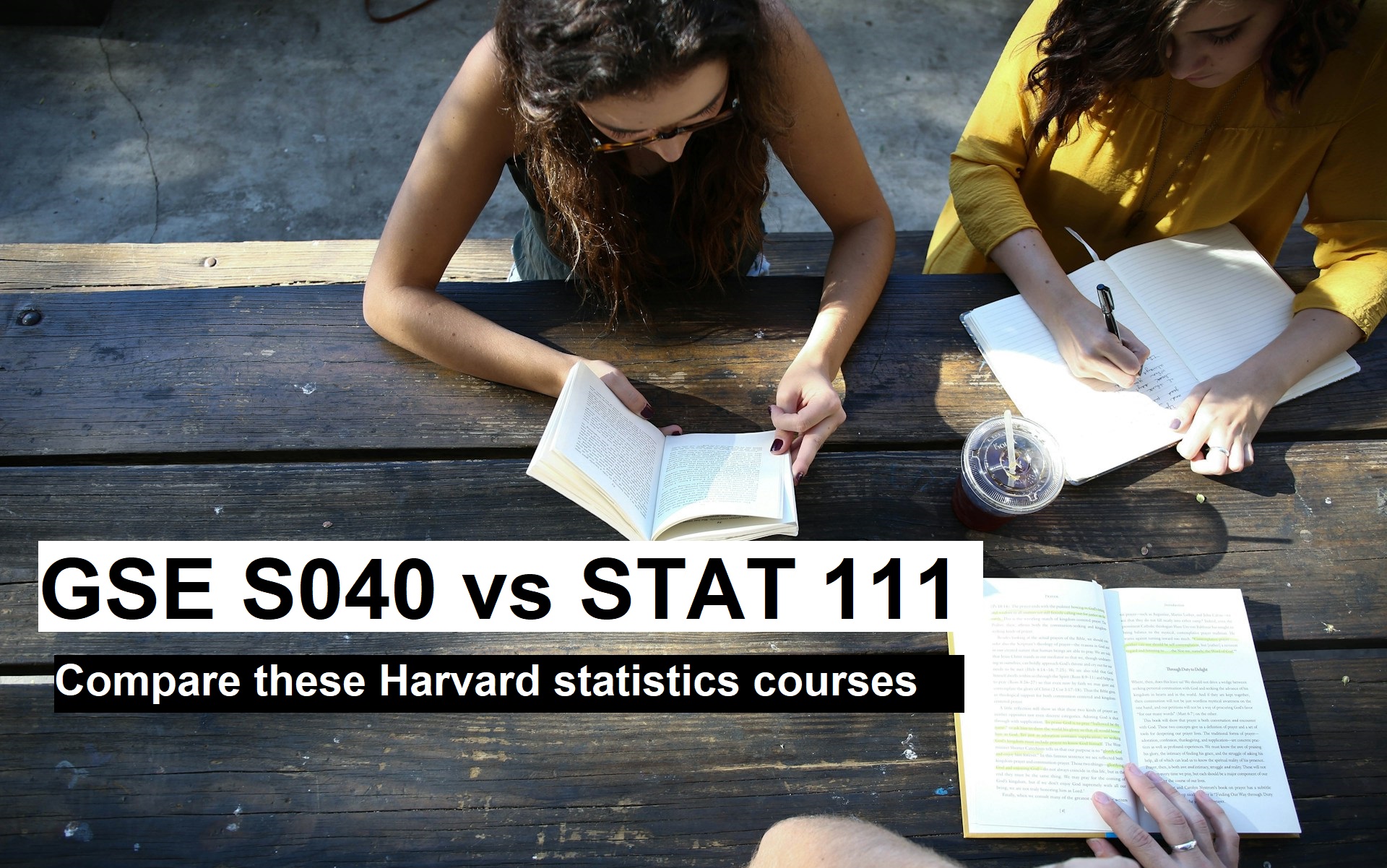Confused between GSE S040 vs STAT 111? Compare these Harvard statistics courses in detail. Learn which course better suits your academic goals and discover key differences between GSE S040 vs STAT 111.
Understanding the Foundations: GSE S040 and STAT 111
GSE S040 (Introductory and Intermediate Statistics for Educational Research) and STAT 111 (Statistical Inference) represent two distinct approaches to statistical education at Harvard University. While both courses deal with statistical concepts, they serve different academic purposes and target different student populations. GSE S040, offered through the Graduate School of Education, focuses primarily on applied statistics in educational research contexts.
STAT 111, on the other hand, builds upon the theoretical foundations established in STAT 110 (Probability) and delves deeper into mathematical statistics and inference. This course is designed for students seeking a more rigorous mathematical treatment of statistical concepts. The fundamental difference lies in their approach – GSE S040 emphasizes practical applications and interpretation, while STAT 111 focuses on theoretical underpinnings and mathematical proofs.
The historical development of these courses reflects Harvard’s commitment to serving diverse student needs. GSE S040 evolved from the need to equip education researchers with statistical tools for analyzing educational data, while STAT 111 emerged from the mathematics department’s tradition of theoretical rigor and mathematical precision.
Course Structure and Prerequisites for GSE S040 vs STAT 111
The prerequisite structure for these courses differs significantly. GSE S040 requires basic mathematical knowledge and familiarity with algebraic concepts, making it more accessible to students from various academic backgrounds. The course is structured as a semester-long journey through statistical concepts, with emphasis on applied linear regression and its applications in educational research.
STAT 111, however, demands a strong foundation in probability theory, specifically requiring completion of STAT 110 or equivalent coursework. The course structure is more mathematically intensive, building upon concepts like probability distributions, random variables, and limit theorems. Students are expected to handle complex mathematical proofs and theoretical derivations.
The timing and scheduling of these courses also reflect their different purposes. GSE S040 typically offers multiple sections with flexible scheduling options, acknowledging the diverse needs of education graduate students. STAT 111 follows a more traditional schedule, often offered in specific semesters with structured lecture and section meetings.
GSE S040 vs STAT 111, Learning Objectives and Outcomes
GSE S040 aims to develop practical statistical literacy and competency in educational research methods. Students learn to interpret statistical analyses, conduct basic research studies, and understand the implications of statistical findings in educational contexts. The course emphasizes developing skills in statistical software packages commonly used in educational research.
STAT 111’s objectives focus on building a deep theoretical understanding of statistical inference. Students learn to derive statistical methods from first principles, understand the mathematical foundations of inference, and develop rigorous analytical thinking. The course prepares students for advanced work in statistics, data science, and related quantitative fields.
Both courses share some common goals, such as developing critical thinking about data and statistical conclusions. However, their approaches and depth of mathematical treatment differ substantially, reflecting their distinct roles in Harvard’s curriculum.
Key Topics Covered in GSE S040 vs STAT 111 Courses
GSE S040 Topics:
- Descriptive Statistics and Data Visualization
- Hypothesis Testing and Confidence Intervals
- Linear Regression Analysis
- Analysis of Variance (ANOVA)
- Multiple Regression Techniques
STAT 111 Topics:
- Maximum Likelihood Estimation
- Sufficiency and Completeness
- Hypothesis Testing Theory
- Asymptotic Theory
- Bayesian Inference
Software and Tools:
- GSE S040: R, SPSS, Excel
- STAT 111: R, Mathematical Computing
Teaching Methodologies and Resources for GSE S040 vs STAT 111
The teaching approach in GSE S040 emphasizes hands-on learning and practical applications. Classes typically combine lectures with interactive workshops, where students work with real educational datasets. The course utilizes various statistical software packages, and instructors often incorporate case studies from educational research to illustrate concepts.
STAT 111 employs a more traditional lecture-based format, supplemented with problem sets that focus on mathematical proofs and theoretical derivations. The course materials are mathematically rigorous, requiring students to engage deeply with theoretical concepts. Problem-solving sessions and office hours play a crucial role in helping students master the challenging material.
Both courses leverage Harvard’s extensive resources, including statistical computing facilities and online learning platforms. However, they differ in their use of these resources, reflecting their distinct pedagogical approaches and learning objectives.
Assessment Methods and Grading Criteria
The assessment methods in both GSE S040 and STAT 111 reflect their distinct pedagogical approaches. GSE S040 employs a continuous assessment model with multiple components, including homework assignments, problem sets, and a term project. The final grade typically comprises approximately 50% from homework assignments, 25% from problem sets, and 25% from the term project, with a small portion allocated to attendance and participation.
STAT 111’s evaluation structure is more theoretically focused, with emphasis on mathematical proofs and statistical derivations. The course typically includes bi-weekly problem sets, midterm examinations, and a comprehensive final examination. Students are evaluated on their ability to understand and apply complex statistical concepts, particularly in areas like maximum likelihood estimation, sufficiency, and hypothesis testing theory.
Both courses maintain high academic standards, typically requiring a grade of B or better for satisfactory performance. For non-graded assessments, clear thresholds are established to determine whether students have achieved adequate mastery of the material.
Career Applications and Future Prospects
Graduates with expertise in either GSE S040 or STAT 111 are well-positioned for diverse career opportunities in an increasingly data-driven job market. GSE S040 graduates often pursue careers in educational research, policy analysis, and program evaluation, with particular success in organizations like educational nonprofits, school districts, and research institutions.
STAT 111 graduates typically find opportunities in more technically oriented roles, such as data science, quantitative research, and statistical consulting. The theoretical foundation provided by STAT 111 is particularly valuable for those pursuing careers in academia or advanced research positions. The job market for statistics professionals continues to grow, with the U.S. Bureau of Labor Statistics projecting a 30% growth rate for statisticians and mathematicians through 2032.
Student Experiences and Reviews
Student feedback indicates distinct experiences in these courses. GSE S040 students often highlight the course’s practical applicability and supportive learning environment. The emphasis on real-world educational data analysis and collaborative projects is frequently cited as particularly valuable for professional development.
STAT 111 students typically describe the course as challenging but rewarding, emphasizing the depth of theoretical understanding gained. While the mathematical rigor can be demanding, students appreciate the strong foundation it provides for advanced statistical work. The course’s reputation for academic excellence and comprehensive coverage of statistical theory makes it a valuable credential for those pursuing advanced degrees or research-intensive careers.
Frequently Asked Questions About GSE S040 vs STAT 111
Which course should I take if I’m interested in educational research?
GSE S040 is specifically designed for students interested in applying statistical methods to educational research questions.
Is prior programming experience required for either course?
While helpful, prior programming experience is not mandatory for either course. Both courses provide necessary software training.
Can I take both courses simultaneously?
It’s generally not recommended due to the workload and potential overlap in foundational concepts.
What prerequisites are required for each course?
GSE S040 requires basic mathematical knowledge, while STAT 111 typically requires completion of STAT 110 or equivalent probability theory coursework.
How much time commitment is required for each course?
Both courses require significant time investment, typically 10-15 hours per week outside of class time.
Making Your Final Decision
The choice between GSE S040 vs STAT 111 should align with your academic goals and career aspirations. Consider your mathematical background, interest in theoretical versus applied statistics, and intended career path. GSE S040 offers a more applied, education-focused approach, while STAT 111 provides deeper theoretical foundations in statistical inference.
Both courses maintain high academic standards and offer valuable but different skill sets. The decision should reflect your personal learning style, career objectives, and comfort level with mathematical concepts. Remember that both courses serve as excellent foundations for further study and professional development in their respective domains.














